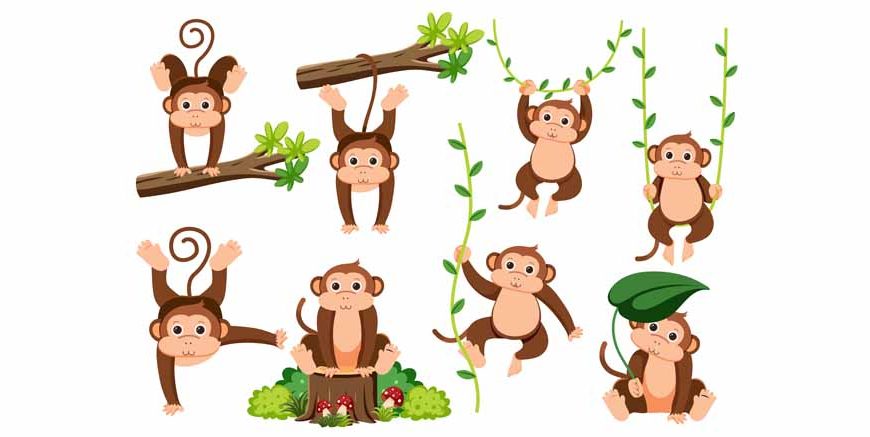Did you know that monkeys aren’t just mischievous pranksters but also some of the smartest animals in the jungle? Sure, they love to swing from trees and sneak off with snacks when no one’s looking, but there’s so much more to these fascinating creatures than meets the eye! From their clever problem-solving skills to surprising eating habits, monkeys are full of fun facts that your kids will love. Keep reading to discover interesting facts about monkeys you can share with your little ones!
15 Interesting Facts About Monkeys
Whether they are swinging through the treetops with their powerful tails or using tools to crack open nuts, monkeys never fail to amaze. Here we have listed 15 interesting facts about monkeys that you can share with your kids.
- Fact 1: There Are Two Types of Monkeys
- Fact 2: Grooming is More Than Just Hygiene for Monkeys
- Fact 3: Monkeys Have Distinct Fingerprints -H3
- Fact 4: Capuchins are Good with Tools
- Fact 5: Monkeys Have a Varied Diet
- Fact 6: Monkeys Can Recognise Themselves in Mirrors
- Fact 7: Monkeys Play a Vital Role in Ecosystems
- Fact 8: Monkeys Have Long Lifespans
- Fact 9: Monkeys Have Their Own Unique Communicative Gestures and Sounds
- Fact 10: Monkeys Hold Religious and Cultural Value in India
- Fact 11: Monkeys Choose Their Sleeping Trees Carefully
- Fact 12: Some Monkeys Have Built-in Umbrellas!
- Fact 13: Monkeys Can Count and Even Do Basic Math
- Fact 14: Howler Monkeys Have the Loudest Call in the Jungle
- Fact 15: Some Monkeys Have Mustaches and Beards
One of the most fascinating pieces of monkey information is that they are broadly classified into two categories: Old World monkeys and New World monkeys. Around the Asia part of the globe lie the nitid and downward older monkeys in Africa and India, which show a number, such as langurs and macaques. The others are located in Central and South America and are known as New World tropes, which are roundnose monkeys with sideways-facing nostrils, which are very amusing. Characteristics are some of the best features that distinguish one type from another.
An interesting fact about monkeys that only a few know is that grooming isn’t just about staying clean. It’s a way for them to show love and build strong friendships. When they pick dirt, bugs, and debris off each other, they strengthen their social bonds and make their companions feel safe and comfortable.
Have you ever heard that monkeys have fingerprints similar to Homo sapiens? That is one of the more obscure monkey facts. Their prints are more than close to ours. In fact, even professionals have trouble telling the differences between the prints, even under a microscope. This aspect of monkeys demonstrates their close evolutionary ties with humans.
Capuchin monkeys are fascinating creatures known for their intelligence and dexterity with tools. They belong to the subfamily Cebinae and are native to Central and South America. Interestingly, they were among the first non-ape primates observed using tools in the wild, and archaeological evidence suggests they’ve been perfecting this skill for over 3,000 years!
One of Capuchin’s most impressive tricks is cracking open nuts. They place nuts on stone “anvils” and use carefully chosen rocks to break them open, adjusting the tool size depending on the nut’s hardness. But that’s not all; Capuchins also use crushed millipedes as a natural insect repellent! This ability to adapt and innovate shows just how advanced their problem-solving skills are.
Monkeys are not picky eaters. Their diets vary greatly and are influenced by their habitat and species. Monkeys exhibit a diverse range of diets. Some species are omnivorous, consuming insects, small animals, and eggs, while others are primarily herbivores, feeding on fruits, leaves, and flowers. This dietary flexibility has contributed significantly to their evolutionary success.
Self-recognition, a rare trait in the animal kingdom, is observed in monkeys. Research indicates that some species, such as the Rhesus macaque, possess this ability, recognising their own reflection in mirrors. This capacity suggests a significant degree of self-awareness and highlights their remarkable intelligence.
Monkeys are integral to the equilibrium of life in the environment. Through their defecation process, they help to facilitate the advancement of forests as they are seed dispersers. Monkeys like the bonnet macaque in India are essential in forest regrowth. This ecological contribution is one of the primary pieces of information about monkeys that demonstrate their significance in the natural world.
Some species of monkeys have a long lifespan. For example, the Rhesus macaque, common in India, can live in the wild for up to 25 years and even longer in captivity.
Monkeys’ communication includes much more than sounds; it comprises complex mechanisms, including body language, facial expressions, and other gestures. Indian langurs and their alarm calls, which warn other animals about an impending attack by leopards, are a perfect example. Such traits are fascinating facts about monkeys and speak to the primate’s impressive social skills.
In the Hindu faith, Hanuman is revered and worshipped for his unparalleled strength and loyalty, which makes him a monkey god. Monkeys are also widely depicted in Indian folklore and celebrated during festivals. Such cultural ideals strengthen the relevance of monkeys in India and add yet another remarkable fact about them that makes them attractive to Indian readers.
A fun fact about monkeys is that they choose their snoozing spots very carefully. They typically choose tall, isolated trees whose branches do not touch others; this is believed to discourage predators, as they cannot move easily between branches. It has the added benefit of protecting against malaria-carrying mosquitoes and reducing exposure to biting insects. Some monkeys like to be near human settlements because of their proximity to food.
Did you know that certain monkey species, like the dusky leaf monkey, have a natural way of staying dry? Their thick fur repels water, acting like a built-in raincoat, helping them stay warm and comfortable even in heavy downpours.
Research has shown that some monkeys, like rhesus macaques, can recognise numbers and even solve simple math problems. In lab experiments, they have demonstrated the ability to add and compare quantities, proving that they have numerical reasoning skills similar to those of young children!
If you ever hear a deep, echoing roar in the rainforest, chances are it’s a howler monkey! These monkeys have specialised throat structures that allow them to produce calls that can be heard up to three miles away, making them one of the loudest land animals on Earth.
Nature sure has a sense of humour! The Emperor Tamarin is a tiny monkey with an elegant white moustache that makes it look like a wise old man. Other monkeys, like the golden snub-nosed monkey, have thick fur that resembles beards, giving them an unmistakably distinguished look.
Conclusion
Monkeys are incredibly amazing animals, and their intelligence, social behaviour, and unique characteristics make them one of the most interesting creatures. From cracking nuts with stone tools to picking the perfect bedtime tree, these fascinating primates have mastered the art of survival in the wild. The next time you spot a monkey swinging through the trees (or trying to steal your snack at the zoo), you’ll know there’s a lot more to them than meets the eye. So, which of these fun monkey facts surprised you the most?
Interested in knowing more about animals? Check out our blog, Wild Animals For Kids: Facts And Safety Tips, for some fun and interesting facts about animals and safety tips to remember when you encounter them from proximity. Don’t forget to check out EuroKids Blogs for more insights into your child’s nutrition, development, and learning.
At EuroKids, we aim to develop and achieve a passion for inquiry and learning about the world. Like the monkeys, kids are naturally curious and adventurous. Our courses are created to inspire this wonder and develop young minds. To know more about how we motivate future generations, visit the nearest EuroKids centre today!















